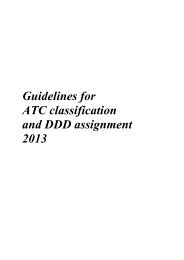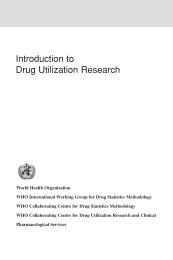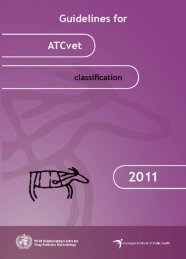- Page 1 and 2: 2011 WHO Collaborating Centre for D
- Page 3 and 4: ISSN 1726-4898 ISBN 978-82-8082-438
- Page 5 and 6: Previous editions: 1990: Guidelines
- Page 7 and 8: Staff of the Centre Christian Berg,
- Page 9 and 10: 8 D. Principles for reviewing and c
- Page 11 and 12: I. INTRODUCTION A. History of the A
- Page 13 and 14: - To organize training courses in t
- Page 15 and 16: It is open to anyone with a legitim
- Page 17 and 18: B. Inclusion and exclusion criteria
- Page 19 and 20: If a new substance fits in both a c
- Page 21 and 22: Example: N02BA71 - acetylsalicylic
- Page 23 and 24: achieved. The harmonisation process
- Page 25: - For some groups of medicinal prod
- Page 29 and 30: - Liquid preparations for inhalatio
- Page 31 and 32: Further reviews of DDDs After the f
- Page 33 and 34: linked to each medicinal product on
- Page 35 and 36: Use of the ATC/DDD system allows st
- Page 37 and 38: The WHO Collaborating Centre for In
- Page 39 and 40: It should be emphasised that assign
- Page 41 and 42: - If no objections are received, th
- Page 43 and 44: In order to include proposals for A
- Page 45 and 46: considered as a guideline since the
- Page 47 and 48: List of DDDs for combined products
- Page 49 and 50: ATC SYSTEM MAIN GROUPS The main gro
- Page 51 and 52: A08 ANTIOBESITY PREPARATIONS, EXCL.
- Page 53 and 54: A01AC Corticosteroids for local ora
- Page 55 and 56: A02AF Antacids with antiflatulents
- Page 57 and 58: 56 combination will, together with
- Page 59 and 60: 58 The classification at the 5th le
- Page 61 and 62: A03EA Antispasmodics, psycholeptics
- Page 63 and 64: A06 LAXATIVES A06A LAXATIVES 62 Lax
- Page 65 and 66: A06AG Enemas 64 All enemas and laxa
- Page 67 and 68: A07C ELECTROLYTES WITH CARBOHYDRATE
- Page 69 and 70: A08 ANTIOBESITY PREPARATIONS, EXCL.
- Page 71 and 72: A10B BLOOD GLUCOSE LOWERING DRUGS,
- Page 73 and 74: 72 In A11AA04 only trace elements a
- Page 75 and 76: 74 The DDDs are based on prophylaxi
- Page 77 and 78:
76 classified in this group. Even c
- Page 79 and 80:
78 Tonics are classified in A13. Th
- Page 81 and 82:
A12CC Magnesium A12CD Fluoride A12C
- Page 83 and 84:
A16 OTHER ALIMENTARY TRACT AND META
- Page 85 and 86:
B BLOOD AND BLOOD FORMING ORGANS B0
- Page 87 and 88:
B02 ANTIHEMORRHAGICS B02A ANTIFIBRI
- Page 89 and 90:
B03AA Iron bivalent, oral preparati
- Page 91 and 92:
90 The DDDs are based on maintenanc
- Page 93 and 94:
B05C IRRIGATING SOLUTIONS 92 In thi
- Page 96 and 97:
C CARDIOVASCULAR SYSTEM C01 CARDIAC
- Page 98 and 99:
C CARDIOVASCULAR SYSTEM C01 CARDIAC
- Page 100 and 101:
C01C CARDIAC STIMULANTS EXCL. CARDI
- Page 102 and 103:
C01E OTHER CARDIAC PREPARATIONS Thi
- Page 104 and 105:
Combinations with other antihyperte
- Page 106 and 107:
C02DD Nitroferricyanide derivatives
- Page 108 and 109:
C02LX Other antihypertensives and d
- Page 110 and 111:
C03BX Other low-ceiling diuretics A
- Page 112 and 113:
C04AC Nicotinic acid and derivative
- Page 114 and 115:
C05BA Heparins or heparinoids for t
- Page 116 and 117:
C07BG Alpha and beta blocking agent
- Page 118 and 119:
Combinations with ACE inhibitors ar
- Page 120 and 121:
C09BB ACE inhibitors and calcium ch
- Page 122:
C10B LIPID MODIFYING AGENTS, COMBIN
- Page 125 and 126:
D10 ANTI-ACNE PREPARATIONS A Anti-a
- Page 127 and 128:
D01AC Imidazole and triazole deriva
- Page 129 and 130:
D02B PROTECTIVES AGAINST UV-RADIATI
- Page 131 and 132:
D04AX Other antipruritics 130 This
- Page 133 and 134:
D06AX Other antibiotics for topical
- Page 135 and 136:
D07BB Corticosteroids, moderately p
- Page 137 and 138:
D08AD Boric acid products 136 Weak
- Page 139 and 140:
D10AB Preparations containing sulfu
- Page 141 and 142:
D11AX Other dermatologicals 140 Thi
- Page 143 and 144:
G GENITO URINARY SYSTEM AND SEX HOR
- Page 145 and 146:
G02 OTHER GYNECOLOGICALS 144 Analge
- Page 147 and 148:
146 Lisuride tablets in high streng
- Page 149 and 150:
G03AD Emergency contraceptives 148
- Page 151 and 152:
G03CX Other estrogens 150 Tibolone
- Page 153 and 154:
152 package which is intended for o
- Page 155 and 156:
G04BC Urinary concrement solvents 1
- Page 158 and 159:
H SYSTEMIC HORMONAL PREPARATIONS, E
- Page 160 and 161:
The DDDs are based on the treatment
- Page 162 and 163:
H02A CORTICOSTEROIDS FOR SYSTEMIC U
- Page 164 and 165:
H04 PANCREATIC HORMONES H04A GLYCOG
- Page 166 and 167:
J ANTIINFECTIVES FOR SYSTEMIC USE J
- Page 168 and 169:
J01 ANTIBACTERIALS FOR SYSTEMIC USE
- Page 170 and 171:
inhibitor are classified at a separ
- Page 172 and 173:
J01EA Trimethoprim and derivatives
- Page 174 and 175:
J01MA Fluoroquinolones Flumequine i
- Page 176 and 177:
The parenteral DDD for fosfomycin i
- Page 178 and 179:
J04B DRUGS FOR TREATMENT OF LEPRA J
- Page 180 and 181:
The DDD of oseltamivir is based on
- Page 182 and 183:
5th level, while other monovalent v
- Page 184:
J07BJ Rubella vaccines Combinations
- Page 187 and 188:
L ANTINEOPLASTIC AND IMMUNOMODULATI
- Page 189 and 190:
L01X OTHER ANTINEOPLASTIC AGENTS 18
- Page 191 and 192:
L03AA Colony stimulating factors L0
- Page 194 and 195:
M MUSCULO-SKELETAL SYSTEM M01 ANTII
- Page 196 and 197:
Combinations with drugs classified
- Page 198 and 199:
M01CA Quinolines The DDDs are based
- Page 200 and 201:
M03AC Other quaternary ammonium com
- Page 202 and 203:
M05 DRUGS FOR TREATMENT OF BONE DIS
- Page 204 and 205:
N NERVOUS SYSTEM N01 ANESTHETICS A
- Page 206 and 207:
N01AX Other general anesthetics Thi
- Page 208 and 209:
N02A OPIOIDS This group comprises s
- Page 210 and 211:
N02AG Opioids in combination with a
- Page 212 and 213:
Lysine acetylsalicylate is classifi
- Page 214 and 215:
The DDDs for the substances in this
- Page 216 and 217:
The DDD for the combination of levo
- Page 218 and 219:
N05AN Lithium The DDD is based on t
- Page 220 and 221:
The DDDs are based on use of the dr
- Page 222 and 223:
N06AF Monoamine oxidase inhibitors,
- Page 224 and 225:
N07B DRUGS USED IN ADDICTIVE DISORD
- Page 226 and 227:
P ANTIPARASITIC PRODUCTS, INSECTICI
- Page 228 and 229:
The DDDs in this group are based on
- Page 230 and 231:
P01C AGENTS AGAINST LEISHMANIASIS A
- Page 232 and 233:
The DDD for diethylcarbamazine is b
- Page 234 and 235:
R RESPIRATORY SYSTEM R01 NASAL PREP
- Page 236 and 237:
The DDDs are based on the treatment
- Page 238 and 239:
Antibiotics for systemic use, see J
- Page 240 and 241:
The DDDs for combination products a
- Page 242 and 243:
R03DA Xanthines A number of prepara
- Page 244 and 245:
R05D COUGH SUPPRESSANTS, EXCL. COMB
- Page 246 and 247:
The group is subdivided according t
- Page 248 and 249:
S SENSORY ORGANS S01 OPHTHALMOLOGIC
- Page 250 and 251:
S01AX Other antiinfectives This gro
- Page 252 and 253:
S01ED Beta blocking agents Combinat
- Page 254 and 255:
Hypromellose is classified in this
- Page 256 and 257:
S02D OTHER OTOLOGICALS This group c
- Page 258 and 259:
V VARIOUS V01 ALLERGENS A Allergens
- Page 260 and 261:
V VARIOUS This group comprises many
- Page 262 and 263:
The DDDs for calcium folinate, calc
- Page 264 and 265:
V06 GENERAL NUTRIENTS This group co
- Page 266 and 267:
V07AS Stomi equipment V07AT Cosmeti
- Page 268 and 269:
( 99m Tc) exametazime labelled cell
- Page 270 and 271:
classified according to such indica
- Page 272 and 273:
V10 THERAPEUTIC RADIOPHARMACEUTICAL
- Page 274 and 275:
List of terms: AC-system Anatomical
- Page 276:
Plain preparation Preparations cont
- Page 280 and 281:
Requested by: Name: Company: Addres
- Page 282:
ANNEX II
- Page 285 and 286:
Payment details ORDER FORM - ATC/DD





